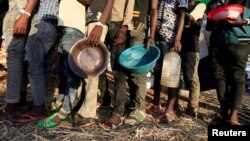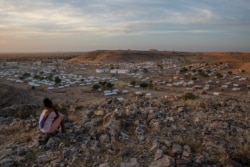The U.N. refugee agency is appealing for $455 million to help protect millions of refugees and displaced people from the COVID-19 pandemic.
Monitoring carried out by the U.N. refugee agency in 13 countries since the onset of the pandemic found 74% of these vulnerable groups are able to meet less than half of their basic needs. This is a 21% increase over pre-pandemic days in 2019.
In addition, the report noted that more than 80% of vulnerable people have turned to negative coping mechanisms to survive, including selling their belongings, becoming sex workers and resorting to child labor.
UNHCR spokesman Babar Baloch said urban refugees rely on a daily wage to pay for essentials, but jobs and livelihoods have been crushed by COVID-19 lockdowns.
"In many locations, they have been just wiped out as markets close down, as the scope for daily work with restrictions closed down," Baloch said.
Baloch said refugees are unable to practice social distancing in overcrowded displacement camps, so more emphasis will be placed on providing water, soap and other essential tools to keep people safe.
"If you look at the picture in Sudan — Sudan is where refugees from Ethiopia are recently arriving — it is a big challenge," he said. "We have more than 51,000 refugees that have arrived in recent weeks [who] are scattered in the border areas. It also is a challenge and an effort to make sure that they are safe from the COVID pandemic, as well as their host communities."
The U.N. refugee agency said funding can help provide for basic needs, as well as helping to prevent gender-based violence, to protect people from exploitation, and to provide mental health and psychological counseling.
The agency is making education a priority by reopening safe schools where possible, or investing in online and offline distance education.





